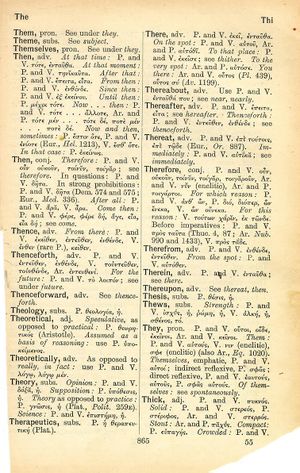they: Difference between revisions
From LSJ
ὁ δ' εὖ ἔρδων θεοὺς ἐλπίδι κυδροτέρᾳ σαίνει κέαρ → but he who does well to the gods cheers his heart with a more glorious hope
(Woodhouse 5) |
(CSV5) |
||
| Line 1: | Line 1: | ||
{{ | {{Woodhouse1 | ||
| | |Text=[[File:woodhouse_865.jpg|thumb|link={{filepath:woodhouse_865.jpg}}]]'''pron.''' | ||
P. and V. οὗτοι, οἵδε, ἐκεῖνοι, Ar. and V. κεῖνοι. | |||
<b class="b2">Them</b>: P. and V. αὐτούς, V. νιν (enclitic), σφε (enclitic) (also Ar., <b class="b2">Eq.</b> 1020). | |||
<b class="b2">Themselves</b>, emphatic, P. and V. αὐτοί; indirect reflexive, P. [[σφᾶς]]; direct reflexive, P. and V. ἑαυτούς, αὑτοῦς, P. [[σφᾶς]] αὐτούς. | |||
<b class="b2">Of themselves</b>: see [[spontaneously]]. | |||
}} | }} | ||
Revision as of 10:06, 21 July 2017
English > Greek (Woodhouse)
pron.
P. and V. οὗτοι, οἵδε, ἐκεῖνοι, Ar. and V. κεῖνοι.
Them: P. and V. αὐτούς, V. νιν (enclitic), σφε (enclitic) (also Ar., Eq. 1020).
Themselves, emphatic, P. and V. αὐτοί; indirect reflexive, P. σφᾶς; direct reflexive, P. and V. ἑαυτούς, αὑτοῦς, P. σφᾶς αὐτούς.
Of themselves: see spontaneously.

